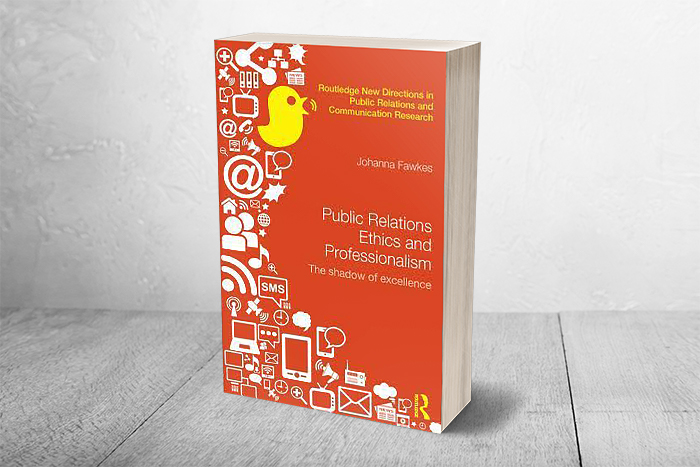Public Relations Ethics and Professionalism

About the author
Richard Bailey Hon FCIPR is editor of PR Academy's PR Place Insights. He teaches and assesses undergraduate, postgraduate and professional students.

Public Relations Ethics and Professionalism: The Shadow of Excellence
Johanna Fawkes
2015, Abingdon: Routledge
The Bell Pottinger scandal placed public relations ethics on the front pages of national newspapers, and led to denunciations from within the industry.
So it’s now timely to take a fresh look at a distinctive academic contribution to the debate – though this is not a book that will reassure those who simply want to proclaim they’re ‘holier than thou’ or apply an out-of-the-box solution to all ethical dilemmas.
Instead, the author draws on Carl Jung and revels in messiness rather than seeking over-simple neatness. The book argues that self-awareness is a precondition for ethical action.
First, Fawkes maps out the public relations scholarly field. She shows that the dominant theory (symmetry-excellence) rejects persuasion as generally unethical. Yet rather than making the practice more ethical and professional by leading it towards the two-way symmetric ideal, this has merely outlawed most public relations activity as flawed.
Next, she turns to definitions of professionalism. Do professions exist to serve society (as they claim) or do they primarily serve the interest of their members? Is it because of the decline in trust in professions that they turn to ethics for validation?
On the notion that professions should serve society, the numerous scandals in professions regulated by ethical codes suggest a gap between rhetoric and reality.
Can public relations be considered a profession? It’s not a simple question, because unlike medicine or law, anyone can practise PR. If not a full profession, what about a community of practice embracing practitioners and commentators and co-creating meaning?
Fawkes argues that the teaching of ethics tends to be limited to traditional approaches (deontological and consequentialist) and ignores more recent ethical theory (virtue ethics, feminist, postcolonial and postmodern approaches).
And so to Jung. We may feel this is unfamiliar territory, but ‘Jungian concepts permeate the culture through talk of introverts and extraverts, archetypes, collective unconscious… His study of personality types has been modified into the Myers-Briggs index’.
‘A Jungian approach cannot yield a code of conduct, prescribing correct and incorrect actions… The Jungian ethical journey is inwards towards realization rather than outwards for instruction.’
The author’s approach is to treat a profession as an entity possessing a collective culture and sharing aspects of human consciousness – and so capable of Jungian psychoanalysis.
Professional qualifications and continuous professional development (CPD) schemes emphasise reflection and uphold the reflective practitioner as the ideal. Fawkes argues that public relations needs to explore its shadow side (the ‘dark arts’ of publicity and persuasion) and avoid scapegoating ‘the other’.
Fawkes writes ‘I have long believed that the central shadow issue to PR is persuasion, and its murky relationship to propaganda… The denial of PR’s roots in propaganda leads to the denial of persuasion…. The chasm between the concept of ethical guardian and advocate undermines the field’s attempts to evolve a meaningful approach to ethics.’
Her approach is to address the real problem of persuasion: not that we as PR practitioners seek to persuade others, but that we’re too easily persuaded ourselves to adopt the party line. ‘It may be that failure to acknowledge the persuasion at the heart of most PR has infantilized our ethical approaches’
Adopting a Jungian approach, Fawkes sees a metaphor for public relations in the Greek god Hermes, the messenger who also acted as the boundary spanner between gods and man. ‘Hermes is also the arch-Trickster in Greek mythology, the deceiver, double-sayer, unreliable guide.’
This is a tightly-argued, extensively-referenced academic book (in other words it’s a challenging read). But the author’s clarity of thought shines through and she introduces her own experiences and reflections into the text.
‘Teaching the Chartered Institute of Public Relations diploma to senior practitioners, I was often struck by their resistance to developing strategy when there were glitzy tactics to be drummed up…. My plaintive cry in the face of all their excited plans was usually ‘why’?’
This book is a plea for a more grown up understanding of public relations. One that moves beyond the idealistic claims that practitioners act as ethical guardians on the one hand, or are unscrupulous manipulators on the other.